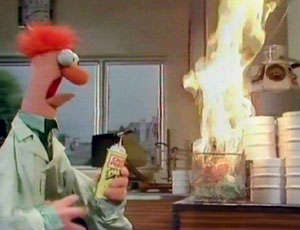A Turning Point for the IPCC…and Humanity?
September 17th, 2013 by Roy W. Spencer, Ph. D. |
| A climate modeller increasing his model's climate sensitivity |
I usually don’t comment on recently published climate research papers, partly because they rarely add much, and partly because other blogs do a pretty good job of covering them anyway. The reason why I say “they rarely add much” is that there are a myriad of theories that can be justified with some data, but rarely is the evidence convincing enough to hang your hat on them.
One of the things I’ve learned in the climate research business is that it is really easy to be wrong, and really difficult to be right. There are many competing theories of what causes climate change, and they can’t all be correct.
But a few recent papers on climate sensitivity, and on the previously under-appreciated role of natural climate variations, and the apparent backing-off by the IPCC on climate sensitivity in the upcoming AR5 report, now warrants a few comments. (We also have our own paper, slated to be published on October 31, which will present new results on climate sensitivity and the role of natural climate variations in recent warming.)
I have always been convinced that the IPCC was created by bureaucrats to achieve specific policy ends. I was even told so by one of those bureaucrats, Bob Watson, back in the early 1990s. Not that there aren’t ‘true believers’ in the movement. In my experience, the vast majority of the scientists and politicians involved in the IPCC process appear to really believe they are doing what is right for humanity by supporting restrictions on fossil fuel use.
But now, with the IPCC unable to convincingly explain the recent stall in warming (some say a change to weak cooling), the fact that they are forced to actually recognize reality and make changes in their report — possibly reducing the lower bound for future warming, thus reducing the range of climate sensitivity — is quite momentous.
It might well be that so widespread is the public knowledge of the hiatus in warming, recovering Arctic sea ice (at least temporarily), continuing expansion of Antarctic sea ice, failed predictions of previous IPCC reports, etc., are forcing them to do something to save face. Maybe even to keep from being de-funded.
For the last 10-20 years or more, a few of us have been saying that the IPCC has been ignoring the elephant in the room…that the real climate system is simply not as sensitive to CO2 emissions as they claim. Of course, the lower the climate sensitivity, the less of a problem global warming and climate change becomes.
This elephant has had to be ignored at all costs. What, the globe isn’t warming from manmade CO2 as fast as we predicted? Then it must be manmade aerosols cooling things off. Or the warming is causing the deep ocean to heat up by hundredths or thousandths of a degree. Any reason except reduced climate sensitivity, because low climate sensitivity might mean we really don’t have to worry about global warming after all.
And, if that’s the case, the less relevant the IPCC becomes. Not good if your entire professional career has been invested in the IPCC.
But forecasting the future state of the climate system was always a risky business. The Danish physicist, Niels Bohr, was correct: “Prediction is very difficult, especially about the future.”
Unlike daily forecasts made by meteorologists, the advantage to climate prognosticators of multi-decadal forecasts is that few people will remember how wrong you were when your forecast finally goes bust.
Yet, here we are, with over 20 years of forecasts from the early days of climate modelling, and the chickens are finally coming home to roost.
I’m sure the politicians believed we would have had new energy policies in place by now, in which case they could have (disingenuously) claimed their policies were responsible for global warming “ending”. Not likely, since atmospheric CO2 continues to increase, and even by the most optimistic estimates renewable energy won’t amount to more than 15% of global energy generation in the coming decades.
But it’s been nearly 20 years since Al Gore privately blamed us (now, the UAH satellite temperature dataset) for the failure of his earliest attempt at CO2 legislation. Multiple attempts at carbon legislation have failed. The lack of understanding of basic economic principles on the part of politicians and scientists alike led to the unrealistic expectation that humanity would allow the lifeblood of the global economy — inexpensive energy — to be restricted.
Of course, in the U.S. we still have the EPA as a way to back-door policies some politicians desire, without having to go through the inconvenience of our elected representatives agreeing.
But, I digress. My main point is that nothing stands in the way of a popular theory (e.g. global warming) better than failed forecasts. We are now at the point in the age of global warming hysteria where the IPCC global warming theory has crashed into the hard reality of observations. A few of us are not that surprised, as we always distrusted the level of faith that climate modelers had in their understanding of the causes of climate change.
I continue to suspect that, in the coming years, scientists will increasingly realize that more CO2 in the atmosphere is, on the whole, good for life on Earth. Given that CO2 is necessary for life, and that nature continues to gobble up 50% of the CO2 we produce as fast as we can produce it, I won’t be that surprised when that paradigm shift occurs, either.
Ross Mckitrick has a good article in the Financial Post about the failures of the IPCC models
ReplyDeletehttp://opinion.financialpost.com/2013/09/16/ipcc-models-getting-mushy/